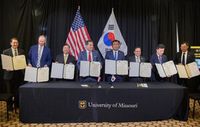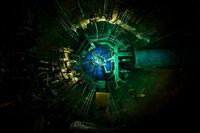A South Korean consortium has achieved a significant milestone by successfully exporting research reactor technology to the United States. The consortium, comprising the Korea Atomic Energy Research Institute, Hyundai Engineering, and the American company MPR, has signed an initial design contract for the "next-generation research reactor project" with the University of Missouri. This project marks a notable advancement in international nuclear collaboration, as it involves designing a new high-performance research reactor with a thermal output of 20 MW.
The Ministry of Science and ICT announced on April 17, 2025, that the consortium had secured the initial design contract. The ministry highlighted the research reactor’s enhanced nuclear proliferation resistance, achieved by increasing uranium density, as a critical technological factor. This development underscores the importance of nuclear fuel technology in modern nuclear projects.
The initial design phase of the project will focus on analyzing pre-construction site conditions and conducting environmental impact assessments. This step is crucial before moving on to the conceptual design of the research reactor. The consortium was selected as the final negotiation target for this project in July of the previous year, following a competitive international bidding process.
The Ministry of Science and ICT outlined plans to bolster strategies for the overseas expansion of research reactors in June of 2025. These plans include enhancing the strategic export of research reactors, creating a public-private partnership-based export foundation, advancing technology, and expanding export opportunities through international cooperation. The ministry’s efforts aim to strengthen South Korea’s position in the global nuclear industry.
The successful export of research reactor technology to the United States is a testament to South Korea’s well-established nuclear industry, known for its technological advancements and export capabilities. This achievement is particularly significant given the United States’ historical leadership in nuclear technology and its increasing engagement in international collaboration and competition in the nuclear sector.
The development of high-density uranium fuel that enhances nuclear non-proliferation resistance is a critical aspect of this project. This technology is designed to create fuel that is less susceptible to being used for nuclear weapons, aligning with global nuclear policy and safety standards. The South Korean consortium’s emphasis on this aspect highlights its importance in international nuclear agreements.
In a historical context, South Korea's journey in nuclear technology has come full circle. Sixty-six years ago, Korea introduced a research reactor from the United States, and now it is exporting its own advanced reactor design back to the U.S. According to the Ministry of Science and ICT, this achievement illustrates the maturity of South Korea's nuclear capabilities and its recognition on the global stage.
Jeong Taek-ryul, a public convergence research policy officer at the Ministry of Science and ICT, stated, "Unless there is an unexpected change, Korea will also take charge of the next step, basic and concept design, and in that case, the size of the contract will be larger." This forward-looking perspective indicates the consortium's confidence in further collaboration with the University of Missouri.
Lim In-cheol, vice chairman of the Korea Atomic Energy Research Institute and head of the consortium, expressed pride in the achievement, saying, "It means that the level of Korean nuclear technology is high enough to be recognized by the United States, the host of nuclear power." This statement underscores the significance of the partnership and the technological capabilities that South Korea brings to the table.
The University of Missouri has been using a 10-megawatt (MW) research reactor built in 1966, the largest of any American university. The university ordered a project to create a research reactor with improved performance, and South Korea's consortium has taken the first step in fulfilling this request. Over the next six months, the consortium will begin to determine the appropriate design requirements and facilities based on the applications the University of Missouri desires.
In addition to the technical advancements, the financial aspects of the contract are noteworthy. The initial design phase is valued at $10 million (about 14 billion won), reflecting the scale and importance of the project. Hyundai Engineering will be in charge of business management and comprehensive design, leveraging its extensive experience in the nuclear sector.
Hyundai Engineering has organized a nuclear energy team since 1985 and has carried out a total of 240 design services, including operating nuclear power plants, site surveys, and research facilities. An official from Hyundai Engineering stated, "Most of all, we have already cooperated with the Korea Atomic Energy Research Institute during the Dutch Delft Research Road Improvement Project, so we are looking forward to synergy again this time." This collaboration is expected to enhance the project's success.
Professor Shim Hyung-jin, a nuclear engineering expert at Seoul National University, commented on the achievement, stating, "The achievement shows the comprehensive growth of Korean nuclear technology." He added, "It is meaningful that we export research reactors to American universities now, regardless of the economic effect." This sentiment reflects the pride and significance of South Korea's technological advancements.
Despite recent geopolitical tensions, including the U.S. designating South Korea as a "sensitive country," officials have emphasized that there are no issues with Korea-U.S. cooperation in science and technology. Vice Minister Lee noted, "The U.S. has always said that there is no problem with Korea-U.S. cooperation in science and technology, and this achievement is a concrete outcome." This assurance is crucial for maintaining collaborative efforts in the nuclear sector.
As the director of the Korea Atomic Energy Research Institute visits the United States to meet with scientific figures, he reiterated that the local atmosphere remains positive and unchanged. He stated, "There is no need to react sensitively," reinforcing the notion that ongoing cooperation is expected to continue without disruption.
The successful export of South Korea's research reactor design to the United States not only signifies a technological triumph but also marks a pivotal moment in international nuclear collaboration. It showcases South Korea's capabilities in nuclear technology and sets the stage for future advancements in the field.


